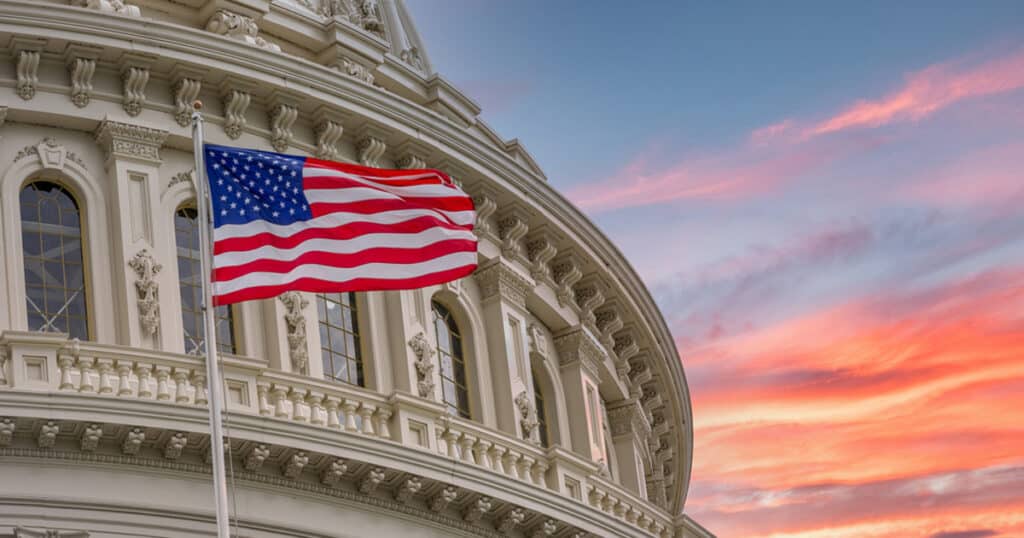
What’s in the Senate’s government funding minibus?
When House lawmakers return from their August recess in September, they’ll have to decide whether to remain on their partisan course in government funding negotiations, or unite to pass all 12 appropriations bills on time, starting with the Senate’s minibus.
Right before leaving for their own recess, senators passed a bipartisan but long-fought over minibus containing three out of the dozen appropriations bills that provide money for federal agencies to spend in fiscal year 2026, which begins Oct. 1.
The package allocated more than $153 billion for military construction and Veterans Affairs — as well as hundreds of billions in advance funding and mandatory spending — $27 billion for agriculture and rural development, and more than $2.2 billion for the Legislative branch.
Appropriations bills are typically passed individually. The unorthodox move is the result of Democrats stalling on confirming the rest of President Donald Trump’s civilian nominees and by doing so preventing progress on the funding appropriations process.
Over 80 senators, however, ultimately voted for the minibus due to the bipartisan content of the bills, while the House has passed only two appropriations bills, which Republicans crafted without Democrats’ input, on mostly partisan lines.
Given the impending risk of a government shutdown if the appropriations bills fail to pass, Senate Majority Leader Sen. John Thune, R-S.D., is hoping House Republicans will accept the minibus without making changes.
The minibus consists of funding bills crafted by the Appropriations subcommittees on Military Construction, Veterans Affairs, and Related Agencies; Agriculture, Rural Development, Food and Drug Administration, and Related Agencies; and Legislative Branch.
The MilCon-VA bill provides $133.3 billion for non-defense discretionary funding and $19.8 billion in defense spending for military construction and housing.
It also authorizes $300.4 billion in mandatory spending on federal programs for veterans, which is not officially included in the overall bill cost, since the Congressional Budget Office assumes renewing “current policy” spending does not add to the federal deficit.
Additionally, the bill provides advance funding for veterans in fiscal year 2027, including $122.3 billion for medical care and $262 billion for benefits.
While the MilCon-VA bill might receive bipartisan approval, the $27.1 billion Ag-FDA bill will likely receive pushback from some House Republicans, given its refusal of multiple budget requests from President Donald Trump.
Among other things, the bill gives $7 billion to the Food and Drug Administration, nearly $1.7 billion for the National Institute of Food and Agriculture, and $1.74 billion for two international food aid programs. Trump had requested that funding levels for the FDA, NIFA and global food aid be slashed.
The bill also fully funds all government nutritional assistance programs, including WIC, CSFP, SNAP and school meals programs. The funding for SNAP may clash with provisions in the recently-passed One Big Beautiful Bill Act, which directed states to shoulder a greater portion of SNAP funding.
The third piece of legislation in the minibus – the Legislative Branch bill – funds both chambers of Congress, the United States Capitol Police, the Congressional Budget Office and the Government Accountability Office, among other organizations connected to the legislature.
Additionally, the bill prohibits members from acquiring telecommunications equipment from Huawei or ZTE Corporation and from purchasing drones manufactured in China by USCP and AOC.
House Republicans will likely take issue with some of the funding levels in the bill, particularly the Senate’s funding of GAO, which the lower chamber’s draft bill had gutted.
If lawmakers are unable to work quickly and bipartisanly on the remaining government funding bills, they will likely have to pass a Continuing Resolution, or CR, to keep government funding on cruise control until all the bills pass. That would make it the fourth time in a row that Congress punted on completing the appropriations process.



